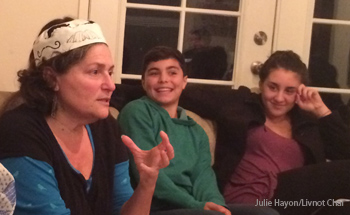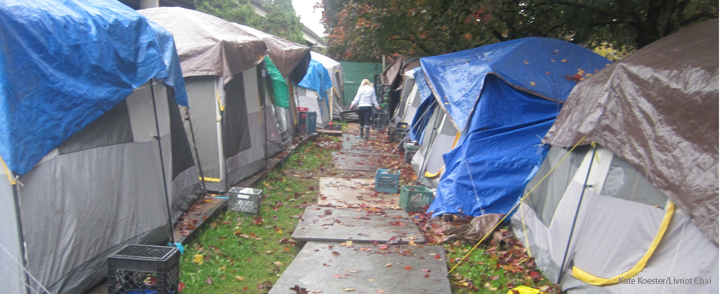By Neve Levinson
A sukkah is a temporary dwelling that modern Jews create to reconstruct the shelters our ancestors used while wandering in the desert. The only restrictions on how they should stand are that they must have a complete open wall, and its visitors must be able to see the stars above them. I’ve been in the sukkah my temple erects each year, but until recently I hadn’t been inside of one made for non-religious purposes.

Tent City 3 is one such conglomeration. Although the entrance to the spaces zip up, and a rain flap covers the roof, it doesn’t drown out the rain overhead. In this city, up to 100 homeless men and women live together, fighting the cold. They eat together, and on a recent autumn day, the Livnot Chai high school program came into their dwelling places and shared a meal. Livnot staff members Kate Koester and Julie Hayon did all of the cooking beforehand; we served the meal and spoke with some residents.
I see homeless men and women every day. On my way to school, at bus stops, out the window on my ride home. But I had never talked to them, or felt like I could. Stigma and fear surround homelessness, but you wouldn’t know it by visiting Tent City 3. There, homelessness was just a fact of life that everyone had, to some degree, accepted. Residents all have this in common, and together they move on to the things in life we all have: Laughing at a dog sprinting through camp; trying to find a toddler who has decided to hide. I carried cups of lemonade to a woman and her husband, and got to see into this hidden world.
Tent City 3 is one of several self-governed communities for homeless people throughout King County, and it runs on an entirely democratic system where everyone pitches in to make the community run smoothly. Every two weeks, residents hold an all-camp meeting to decide who will be its overseer. As a condition of staying there, each resident must sign up for the 24-hour security patrol and litter patrols weekly. It is also a sober and nonviolent community, and if a resident is found violating these rules, the camp can vote to ban that person for 24 hours, until he or she sobers up. After this time is up, and the resident once again follows camp rules, he or she will be unbarred. Further bans can be put in place with further violations.
This may sound like a good system, but the point of Tent City 3 is that it’s temporary. No one who stays there is expected to stay long: each resident gets two bus tickets a day to help get to and from work or necessary locations such as medical appointments or job interviews to get out of where they are now. One thing I learned that encouraged me was that a large percentage of the residents have stable jobs, so these bus tickets are especially crucial to them pulling themselves up by their bootstraps.
Tent City 3 moves around a lot. They mostly stay in church parking lots, although Seattle Pacific University will host them for a few months this coming year. But as Roger, the man who gave us the tour, explained, even if Tent City could have a permanent residence, they wouldn’t take it. They go places where they’re visible.
Their stay at SPU doesn’t start until January, and when we visited in October, they were mere days away from losing their little plot of parking lot in the Haller Lake neighborhood — losing it without the usual security of knowing where they would go next.
Can you imagine that? To not know where you can go, except you can’t stay here? The church where they were staying, Haller Lake Methodist Church, had done what it could. They got their electricity and water hooked up to Tent City 3’s portable shower. They let the residents stay. But why had no one else taken them in?
I was obviously aware of homelessness before visiting Tent City 3, but I never had a face to put it with. These people are people, who have problems and needs the same way as you and me. These people have lives they’re living, despite the lack of a permanent home. And seeing the twin boys that have grown up with this as the normal woke me up to their reality. I see people with stories sitting outside the bus window now. People who are stigmatized without anyone ever asking why.
So I’ll leave you with this: A bowl of soup can bring a group of privileged white teens together with men and women who have lived in the grime of our cities alone. Who will your next bowl of soup bring you together with?
Neve Levinson is a sophomore at Ingraham High School in Seattle and a member of Temple De Hirsch Sinai.
